英国教育体制论文
英国教育英语作文

英国教育英语作文British Education System。
The British education system is highly regarded around the world for its quality and excellence. It is a comprehensive system that caters to the needs of students of all ages and abilities, from primary school to university.Primary Education。
Primary education in the UK is compulsory for all children aged between 5 and 11. The curriculum is divided into two stages: Key Stage 1 (ages 5-7) and Key Stage 2 (ages 7-11). The focus is on developing basic literacy and numeracy skills, as well as introducing a range of subjects such as science, history, geography, art, and music.Secondary Education。
Secondary education in the UK is divided into two stages: Key Stage 3 (ages 11-14) and Key Stage 4 (ages 14-16). During these years, students study a range of subjects including English, maths, science, history, geography, modern foreign languages, and technology. They also havethe option to choose additional subjects, such as art, music, drama, and physical education.At the end of Key Stage 4, students take their GCSE exams, which are the equivalent of high school diplomas in other countries. These exams are used to determine whether students are eligible to continue their education at A-level, vocational, or apprenticeship programs.Post-16 Education。
英国教育体制浅谈

英国教育体制浅谈一、英国教育体制简介英国对所有五至十六岁的儿童实行强制性义务教育。
就课程和学历资格而言,英国存在两种不同的体制,一种是英格兰、威尔士和北爱尔兰教育体制,另一种是苏格兰教育体制。
私立学校和公立学校在私立学校体系,家长一般都要付学费;在公立学校体系,教育是免费的。
公立学校通常不接收年龄十六岁以下的外国学生。
学龄前教育私立学校和公立学校都提供学龄前教育。
很多儿童在三岁或四岁时开始在幼儿园或小学的幼儿班接受教育。
预备教育私立学校为五岁至十三岁儿童提供预备教育(或小学教育)。
很多外国学生通常在七岁时以寄宿学生的形式入学。
在十一岁或十三岁的时候升入私立中学学习。
小学教育这是公立教育体系的一部分,为绝大多数英国儿童提供教育。
儿童五岁时上小学,一般在十一岁时升入中学或学院。
中学教育英国所有中学为学生提供教育直至他们年满十六岁,学校帮助学生准备普通中等教育证书考试或者同等水平课程考试。
相当数量的外国学生在十一岁或十三岁时来英国上中学,其中很多人上私立寄宿中学。
十六岁以后教育中学生在十六岁完成强制性义务教育以后,就可以合法地离开学校,开始工作。
不过,大多数学生会以预科学生的身份进入预科学院或者延续教育学院,在那里学习中学高级水平考试课程或者同等水平课程。
外国学生一般在这个阶段来英国接受教育,如学习中学高级水平考试课程,为在英国学习延续课程或上大学做准备。
十八岁以后教育预科生一般在十八岁时完成中学教育。
然后,大部分学生继续攻读延续教育课程或攻读高等教育课程。
延续教育(FE)(包括职业课程和部分本科课程)延续教育是指为年龄十六岁的中学毕业生继续提供的教育和培训。
英国有六百多所公立和私立学院开设延续教育课程。
这些学院开设的课程种类广泛,包括英语语言课程、某些普通中等教育证书课程、中学高级水平考试课程及其同等水平课程、职业课程、衔接课程以及部分本科生课程。
高等教育(HE)(包括本科课程、研究生课程和MBA)高等教育是指大学、学院及其他院校提供的本科以上课程教育和培训。
英语国家概况期末考试英国教育体制作文
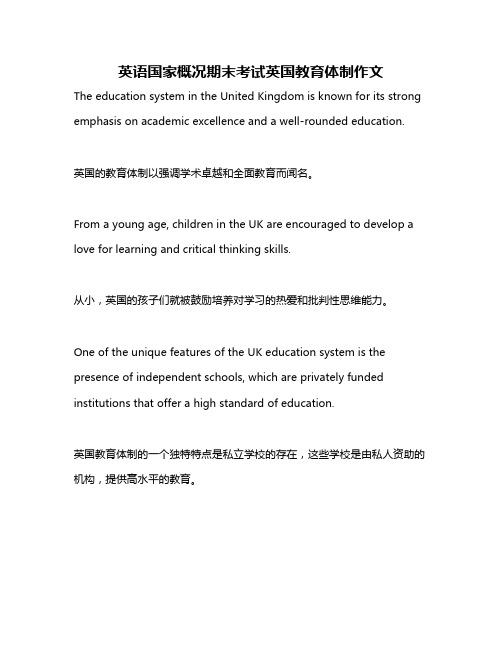
英语国家概况期末考试英国教育体制作文The education system in the United Kingdom is known for its strong emphasis on academic excellence and a well-rounded education.英国的教育体制以强调学术卓越和全面教育而闻名。
From a young age, children in the UK are encouraged to develop a love for learning and critical thinking skills.从小,英国的孩子们就被鼓励培养对学习的热爱和批判性思维能力。
One of the unique features of the UK education system is the presence of independent schools, which are privately funded institutions that offer a high standard of education.英国教育体制的一个独特特点是私立学校的存在,这些学校是由私人资助的机构,提供高水平的教育。
These schools often have smaller class sizes, more resources, and a wider range of extracurricular activities compared to state-funded schools.与公立学校相比,这些学校通常拥有较小的班级规模、更多的资源和更广泛的课外活动。
However, access to independent schools is often limited to those who can afford the high tuition fees, leading to criticisms of elitism and inequality within the education system.然而,私立学校的学费通常较高,只有富有的家庭才能负担得起,这导致对教育体制内精英主义和不平等的批评。
英语国家概况期末考试英国教育体制作文
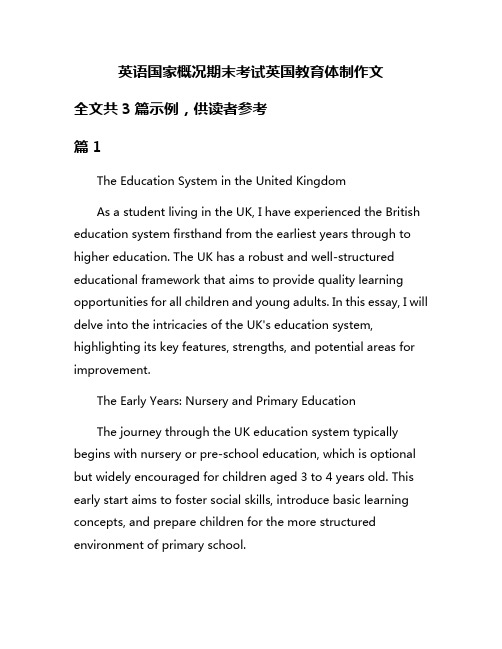
英语国家概况期末考试英国教育体制作文全文共3篇示例,供读者参考篇1The Education System in the United KingdomAs a student living in the UK, I have experienced the British education system firsthand from the earliest years through to higher education. The UK has a robust and well-structured educational framework that aims to provide quality learning opportunities for all children and young adults. In this essay, I will delve into the intricacies of the UK's education system, highlighting its key features, strengths, and potential areas for improvement.The Early Years: Nursery and Primary EducationThe journey through the UK education system typically begins with nursery or pre-school education, which is optional but widely encouraged for children aged 3 to 4 years old. This early start aims to foster social skills, introduce basic learning concepts, and prepare children for the more structured environment of primary school.Primary education in the UK is compulsory for children aged 5 to 11 and is divided into two stages: Key Stage 1 (ages 5-7) and Key Stage 2 (ages 7-11). During these formative years, students are introduced to core subjects such as English, Mathematics, Science, History, Geography, and Art. The curriculum is designed to develop fundamental skills in literacy, numeracy, and critical thinking.One strength of the primary education system in the UK is the emphasis on personalized learning and support. Teachers strive to identify individual student needs and adapt their teaching methods accordingly. Additionally, regular assessments and standardized tests, such as the Key Stage 1 and Key Stage 2 SATs (Standard Assessment Tests), help track student progress and identify areas for improvement.Secondary Education: A Diverse LandscapeUpon completing primary education, students transition to secondary school, typically between the ages of 11 and 16. The secondary education system in the UK is divided into Key Stage 3 (ages 11-14) and Key Stage 4 (ages 14-16).During Key Stage 3, students continue to study a broad range of subjects, including the core subjects of English, Mathematics, and Science, as well as additional subjects likeModern Foreign Languages, History, Geography, Art, Music, and Physical Education. This comprehensive curriculum aims to provide a well-rounded education and allow students to explore their interests and aptitudes.At the end of Key Stage 4, students take the General Certificate of Secondary Education (GCSE) examinations, which are nationally recognized qualifications that assess their performance in various subjects. The GCSE results play a crucial role in determining a student's future educational and career path.One notable aspect of the UK secondary education system is the diversity of school types available. Students can attend state-funded schools (such as community schools, academies, or faith schools), independent or private schools, or grammar schools (which have selective admission based on academic ability). This variety allows parents and students to choose an educational environment that aligns with their preferences and needs.Sixth Form and Vocational EducationAfter completing compulsory secondary education, students in the UK have several options for further study. One popular route is to continue their academic journey through sixth form orcollege, where they can pursue A-Levels (Advanced Level qualifications) or vocational qualifications.A-Levels are subject-based qualifications that are typically studied over two years. Students choose three or four subjects to focus on, which allows them to specialize in areas of interest and prepare for university admission. Common A-Level subjects include Mathematics, English Literature, Biology, Chemistry, Physics, History, Geography, and Modern Foreign Languages.Alternatively, students can opt for vocational qualifications, such as BTECs (Business and Technology Education Council) or NVQs (National Vocational Qualifications). These qualifications are designed to provide practical, work-related skills and knowledge, preparing students for specific careers or further vocational training.Higher Education: Universities and BeyondThe UK is renowned for its prestigious higher education institutions, including world-class universities such as Oxford, Cambridge, Imperial College London, and the University of Edinburgh, among many others. These institutions offer a wide range of undergraduate and postgraduate degree programs, attracting students from across the globe.To gain admission to a UK university, students typically need to meet specific entry requirements, which often include achieving certain grades in their A-Levels or equivalent qualifications. The application process is facilitated through the Universities and Colleges Admissions Service (UCAS), which serves as a centralized system for managing university applications.One strength of the UK higher education system is the emphasis on research and academic excellence. Many universities are at the forefront of cutting-edge research in various fields, providing students with opportunities to engage in groundbreaking work and contribute to advancing knowledge.Potential Areas for ImprovementWhile the UK education system has many strengths, there are also areas that could benefit from further improvement. One concern is the potential for socioeconomic disparities to impact educational outcomes. Students from disadvantaged backgrounds may face additional challenges in accessing quality education or receiving the necessary support and resources.Another area for consideration is the increasing emphasis on standardized testing and assessment, which can lead to anarrowing of the curriculum and excessive pressure on students and teachers. It is essential to strike a balance between accountability and fostering a love for learning and personal growth.Additionally, there are ongoing discussions around the need for greater investment in educational resources, teacher training, and support services to ensure that all students have access to high-quality learning experiences, regardless of their backgrounds or individual circumstances.ConclusionIn conclusion, the education system in the United Kingdom is a multifaceted and evolving framework that aims to provide quality education to all students. From the early years of nursery and primary school through to secondary and higher education, the UK offers a diverse range of educational pathways and opportunities.While the system has its strengths, such as personalized learning, academic rigor, and a focus on research excellence, there is also room for continuous improvement. Addressing socioeconomic disparities, finding the right balance between assessment and nurturing a love for learning, and investing ineducational resources are crucial areas that require ongoing attention and effort.As a student in the UK, I am grateful for the educational opportunities available to me and the dedication of educators who strive to foster a love for learning and personal growth. The UK education system, with its rich history and commitment to excellence, continues to shape the minds of future generations, equipping them with the knowledge, skills, and values necessary to thrive in an ever-changing world.篇2The Education System in the United KingdomAs a student in the UK, I have experienced the British education system firsthand from the early years through to higher education. The UK has a structured yet flexible approach to education that aims to provide quality learning opportunities for all children and young adults. In this essay, I will discuss the key stages, qualifications, and unique aspects of the UK's education system.Early Years and Primary EducationIn the UK, children typically start their educational journey in nursery or pre-school around the age of 3 or 4. This early yearseducation focuses on play-based learning, social development, and introducing basic literacy and numeracy skills. At the age of 5, children enter primary school, which lasts for 6 years until they are 11 years old.Primary education in the UK covers key subjects like English, mathematics, science, history, geography, art, music, and physical education. The curriculum is designed to develop a solid foundation in core academic areas while also nurturing creativity, critical thinking, and well-rounded personal growth. Primary schools use various teaching methods, including whole-class lessons, group work, and individual activities, to cater to different learning styles.Secondary Education and QualificationsAfter completing primary school, students move on to secondary education, which typically spans from ages 11 to 16 (or 18 in some cases). Secondary schools in the UK are divided into several key stages:Key Stage 3 (ages 11-14): This stage builds upon the knowledge and skills acquired in primary school, with a focus on subjects like English, mathematics, science, history, geography, foreign languages, art, music, and physical education.Key Stage 4 (ages 14-16): During these two years, students work towards obtaining their first major qualifications, typically the General Certificate of Secondary Education (GCSE) or equivalent qualifications. GCSEs are subject-based exams that assess a student's knowledge and skills in various subjects. They are graded from 9 (highest) to 1 (lowest), with a pass grade typically being 4 or above.After completing Key Stage 4, students have a choice to make:Continue in academic education and pursue A-Levels (Advanced Level qualifications) or other vocational qualifications like the BTEC (Business and Technology Education Council) at a sixth form college or a school with a sixth form.Seek employment or enroll in vocational training programs, such as apprenticeships or further education colleges.A-Levels and Vocational QualificationsFor those who choose to continue their academic education, A-Levels are the most common pathway. A-Levels aresubject-based qualifications that students typically study for two years (ages 16-18). Most students take three or four A-Level subjects, which are assessed through a combination ofcoursework and final exams. A-Levels are graded from A* (highest) to E, with A*, A, B, and C being considered passing grades for university entry.Alongside A-Levels, vocational qualifications like BTECs are also available. BTECs are more practical and work-related qualifications that prepare students for specific careers or higher education in a particular field. These qualifications are offered at various levels, from entry-level to higher national diplomas, and cover subjects like business, engineering, IT, art and design, and health and social care.Higher EducationAfter completing A-Levels or vocational qualifications, students can choose to pursue higher education at universities or other institutions. The UK has a diverse range of universities, including renowned institutions like Oxford, Cambridge, Imperial College London, and the University of Edinburgh, among many others.To gain admission to a university, students typically apply through the Universities and Colleges Admissions Service (UCAS). Entry requirements vary depending on the university and course, but generally, students need to meet specific grade requirements in their A-Levels or equivalent qualifications.Higher education in the UK offers a range of undergraduate and postgraduate degree programs, including bachelor's degrees (typically 3 years), master's degrees (1-2 years), and doctoral degrees (PhD, usually 3-4 years). Additionally, some universities offer foundation degrees, which are vocational qualifications that combine academic study with workplace learning.Unique Aspects of the UK Education SystemThe UK education system has several unique aspects that set it apart from other countries:Independent Schools (Private Schools): Alongsidestate-funded schools, the UK has a significant number of independent or private schools. These schools are fee-paying and often have a long tradition and reputation for academic excellence. Some of the most prestigious independent schools in the UK are known as "public schools," a term that can be confusing to those unfamiliar with the system.Grammar Schools: In certain areas of the UK, there are selective state-funded grammar schools that admit students based on their performance in an entrance examination. These schools are known for their academic rigor and often serve as apathway for high-achieving students to gain admission to top universities.Boarding Schools: The UK has a tradition of boarding schools, where students live and study on campus during term time. Boarding schools can be found in both the state and independent sectors and offer a unique educational experience with a focus on extracurricular activities and community living.Scottish Education System: Scotland has a slightly different education system from the rest of the UK, with its own qualifications (e.g., Nationals, Highers, and Advanced Highers) and a distinct curriculum. However, Scottish qualifications are recognized and accepted throughout the UK for university entry.In conclusion, the UK education system provides a comprehensive and structured approach to learning, with a focus on developing well-rounded individuals and preparing them for further academic pursuits or the workforce. From the early years through to higher education, the system offers a range of qualifications, pathways, and unique educational experiences that cater to the diverse needs and aspirations of students.篇3The Education System in the United KingdomAs a student in the UK, I have experienced the unique education system here firsthand. The UK has a long and storied history when it comes to education, with some of the oldest and most prestigious universities in the world located within its borders. However, the education journey begins much earlier than university for British students.Compulsory education in the UK starts at age 5 and continues until age 16. From ages 5-11, children attend primary school. The primary curriculum covers core subjects like English, math, science, history, geography, art, music, and physical education. At age 11, students move on to secondary school.Secondary Education (Ages 11-16)This is where the UK system starts to diverge from that of other countries. Instead of a single standardized curriculum, there are several "tracks" students can follow in secondary school. The two main options are:The General Certificate of Secondary Education (GCSE) routeVocational courses and apprenticeshipsThe GCSE is the most common path. Students work towards GCSE exams in a range of subjects like English, maths, sciences, humanities, languages, and electives. GCSE scores are crucial, asthey impact which advanced courses and universities students can progress to after age 16.Alternatively, some students opt for more vocational, hands-on training through courses like BTECs (Business and Technology Education Council qualifications). These allow students to develop practical skills in fields like construction, hospitality, or hair and beauty. Apprenticeships that combine work and study are another vocational option.Post-16 EducationOnce students turn 16, compulsory education ends. However, the majority stay in education until 18 to pursue one of three routes:A-LevelsVocational coursesWorkplace apprenticeshipsA-Levels (Advanced Levels) are two-year subject-based courses that prepare students for university. Students typically take 3-4 A-Level subjects of their choice in areas like maths, English, sciences, languages, humanities and arts. A-Level exams are extremely challenging, requiring deep subject mastery.Alternatively, students can take more vocational courses like BTECs at Level 3 (equivalent to A-Levels). Or they can begin higher-level apprenticeships, earning while receiving on-the-job training.Higher EducationAfter completing A-Levels or equivalent qualifications, students can apply to universities. The UK has a centralized university application system called UCAS that all students use.When applying, students must meet challenging entry requirements set by each university and degree program. These are largely based on A-Level grades and sometimes include admission tests.If accepted, students have two main options:Three-year bachelor's degreesFour-year degrees with an integrated master'sTuition fees for domestic UK/EU students are currently capped at £9,250 per year at public universities in England. Costs can be much higher for international students and at private institutions.Universities in the UK are globally renowned, with institutions like Oxford, Cambridge, Imperial, UCL, and many others ranking among the world's best. However, gaining entry to the top programs is enormously competitive.Overall ThoughtsAs a student, I appreciate how the UK system offers flexibility, with both academic and vocational pathways. The option to begin apprenticeships and career training straight out of secondary school provides alternatives to university for some students.That said, the system does involve extremely high-stakes testing like GCSEs and A-Levels. The pressure to perform well on these exams from an early age can be immense. University entry requirements and costs, especially for domestic students, are also very demanding compared to other European countries.Ultimately though, for academically-inclined students like me, the UK provides a world-class education from primary school through to higher education at its brilliant universities. The system has served me well so far in pursuing my potential through rigorous coursework and examinations.。
英国论文总结范文

摘要:本文旨在分析英国教育体系的特点,探讨其对我国教育改革的启示。
通过对英国教育体系的深入研究,总结其成功之处,为我国教育改革提供借鉴。
一、英国教育体系的特点1. 教育分层明确英国教育体系分为公立教育和私立教育两个层次。
公立教育主要面向普通民众,包括小学、中学和大学。
私立教育则面向富裕家庭,包括私立学校、学院和大学。
这种分层有助于满足不同家庭的教育需求。
2. 课程设置灵活英国教育体系注重培养学生的创新能力和实践能力。
课程设置灵活,注重跨学科学习。
学生可以根据自己的兴趣和特长选择课程,有利于培养学生的个性化发展。
3. 教育资源丰富英国教育体系拥有丰富的教育资源,包括优质的师资、先进的设施和多样的课程。
这使得英国教育质量始终保持在国际领先水平。
4. 重视学生全面发展英国教育体系注重学生的全面发展,包括智力、体育、艺术和德育等方面。
教育过程中,教师关注学生的个性差异,鼓励学生发挥自身特长。
5. 职业教育体系完善英国职业教育体系较为完善,为学生提供了多样化的职业发展路径。
职业教育与普通教育相互衔接,有助于学生顺利进入职场。
二、英国教育体系的启示1. 完善教育分层制度我国可以借鉴英国教育体系中的分层制度,针对不同家庭的经济状况和教育需求,设立不同层次的教育资源。
同时,加强职业教育和普通教育的衔接,为学生提供多元化的职业发展路径。
2. 优化课程设置我国教育可以借鉴英国教育体系中的课程设置,注重培养学生的创新能力和实践能力。
在课程设置上,可以增加跨学科学习,让学生在多个领域有所涉猎。
3. 丰富教育资源我国应加大对教育资源的投入,提高教育质量。
引进优质师资,改善教学设施,为学生提供良好的学习环境。
4. 关注学生全面发展我国教育应注重学生的全面发展,关注学生的个性差异。
在教育过程中,教师应关注学生的德育、体育和艺术等方面,培养学生的综合素质。
5. 加强职业教育我国应借鉴英国职业教育体系,加强职业教育与普通教育的衔接。
英国中小学管理制度论文

摘要英国作为世界教育发达国家之一,其中小学管理制度具有独特性和先进性。
本文通过对英国中小学教育制度的深入研究,分析其管理体制、课程设置、师资培养、评价体系等方面的特点,以期为我国中小学教育改革提供借鉴。
关键词:英国中小学;教育制度;管理体制;课程设置;师资培养;评价体系一、引言英国中小学教育制度在世界范围内具有很高的声誉,其教育质量、管理水平、师资力量等方面都堪称典范。
随着我国教育改革的不断深入,借鉴国外先进的教育制度成为我国教育改革的重要途径。
本文将从英国中小学教育制度的各个方面进行分析,以期对我国中小学教育改革提供有益的启示。
二、英国中小学管理体制1.中央与地方分权的管理体制英国中小学教育管理体制采用中央与地方分权的方式。
中央政府负责制定教育政策、制定课程标准、制定教师资格标准等;地方政府负责学校的日常管理、资源配置、教师招聘与培训等。
这种管理体制有利于发挥中央与地方两个层面的积极性,提高教育管理的效率。
2.学校自主管理在英国,学校拥有较大的自主权。
学校可以根据自身特点和需求,制定课程计划、教学方法、评价体系等。
学校校长和教师有权决定学校的教育教学工作,这有利于提高学校的教育质量和管理水平。
三、英国中小学课程设置1.国家课程与地方课程相结合英国中小学课程设置采用国家课程与地方课程相结合的方式。
国家课程由中央政府制定,包括基础课程和选择性课程。
地方课程由地方政府和学校根据当地实际情况制定。
这种课程设置方式既保证了国家教育标准的一致性,又满足了地方教育的多样性需求。
2.重视实践课程英国中小学课程设置注重实践性,强调学生动手能力和创新能力的培养。
课程内容涉及科学、技术、艺术、体育等多个领域,旨在培养学生的综合素质。
四、英国中小学师资培养1.教师教育体系完善英国教师教育体系包括大学本科教育、研究生教育和教师继续教育。
教师教育注重理论与实践相结合,强调教师的专业素养和教学能力。
2.严格的教师资格认证制度英国实行严格的教师资格认证制度。
有关英国教育制度的论文(2)

有关英国教育制度的论文(2)英国教育的论文篇二:《英国职业教育发展研究》【摘要】英国职业技术教育的几经沉浮,借鉴其中有益经验,可为我国职业教育发展提供积极帮助。
【关键词】英国职业教育缘由一英国职业技术教育的演变1.职业技术教育起步阶段:17世纪末―19世纪后期17世纪末至19世纪末是英国职业教育的起步阶段,可分为两个阶段。
总体上看发展比较落后,尤其是中职教育,与其国力和工业化水平很不相适应。
第一,中等职业技术教育曲折萌芽:17世纪末――18世纪中期。
近代英国职业技术教育孕育于17世纪末,主要由两类职业教育技术机构,一类脱胎于教会举办的慈善学校,如女子学校、公立日校和工读学校。
另一类是19世纪初出现了的技工讲习所,它一般由知名人士和工人协会举办的,面向工人传授简单的现代生产技术原理和技能。
1862年,教育署颁布《修正法典》,把是否以基础读写能力为教学核心作为上述第一类机构获得补助金的条件,其职业技术教育职能逐渐萎缩。
作为英国真正意义的现代职业教育的开端,技工讲习所开始发展还比较顺利,至1850年达600多所,学员50万,但遗憾的是,后来陆续被中产阶级接管,逐渐背离职业教育宗旨。
第二,高等职业技术教育艰难起步:19世纪后期。
19世纪中叶是大英帝国最辉煌的时代。
英国最早完成第一次工业革命,成为当时的“世界工厂”,雄居世界霸主地位。
然而,1860年以后连续多次世界博览会上法、德等国的出色表现让“日不落帝国”举国震惊。
英国实业界的一批有识之士开始反思英国工业产品逊色的原因。
尽管有很多分歧,他们还是达成了以下共识:即英国要保持世界领先地位,就必须依赖技术与技能水平的提高。
在拉塞尔、斯宾塞和塞缪尔森等有识之士的大声疾呼下,英国政府开始重视职业教育。
成立科学教育特别委员会(1868年)和皇家技术教育委员会(1869年),提供政策咨询。
颁布《技术教育法》(1889年),允许地方政府从物品税中提取经费支持技术教育。
英国教育制度介绍英语作文
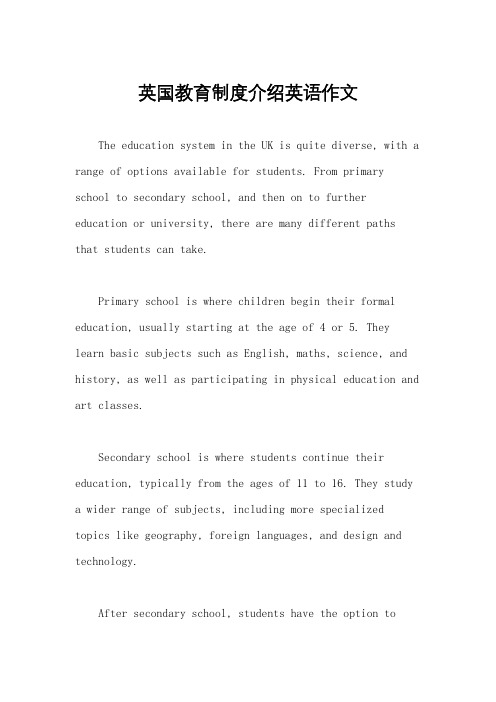
英国教育制度介绍英语作文The education system in the UK is quite diverse, with a range of options available for students. From primary school to secondary school, and then on to further education or university, there are many different pathsthat students can take.Primary school is where children begin their formal education, usually starting at the age of 4 or 5. They learn basic subjects such as English, maths, science, and history, as well as participating in physical education and art classes.Secondary school is where students continue their education, typically from the ages of 11 to 16. They study a wider range of subjects, including more specialized topics like geography, foreign languages, and design and technology.After secondary school, students have the option tocontinue their education at a college or sixth form, where they can study for A-levels or vocational qualifications. Alternatively, they can enter the workforce or pursue apprenticeships.For those who choose to go on to university, there are many prestigious institutions in the UK, offering a wide range of courses and degrees. Students can study everything from law and medicine to art and engineering.Overall, the UK education system provides a variety of opportunities for students to learn and grow, preparing them for future success in whatever path they choose to pursue.。
英国教育系统的优缺点英语作文
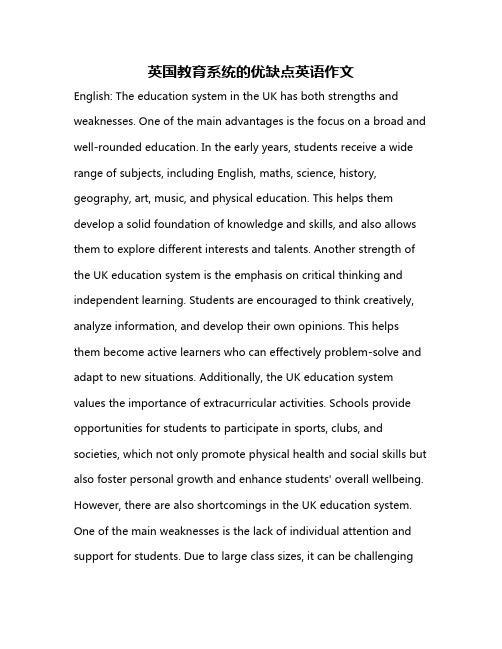
英国教育系统的优缺点英语作文English: The education system in the UK has both strengths and weaknesses. One of the main advantages is the focus on a broad and well-rounded education. In the early years, students receive a wide range of subjects, including English, maths, science, history, geography, art, music, and physical education. This helps them develop a solid foundation of knowledge and skills, and also allows them to explore different interests and talents. Another strength of the UK education system is the emphasis on critical thinking and independent learning. Students are encouraged to think creatively, analyze information, and develop their own opinions. This helps them become active learners who can effectively problem-solve and adapt to new situations. Additionally, the UK education system values the importance of extracurricular activities. Schools provide opportunities for students to participate in sports, clubs, and societies, which not only promote physical health and social skills but also foster personal growth and enhance students' overall wellbeing. However, there are also shortcomings in the UK education system. One of the main weaknesses is the lack of individual attention and support for students. Due to large class sizes, it can be challengingfor teachers to provide personalized guidance to each student. This can result in some students falling behind or not reaching their full potential. Additionally, the UK education system places a heavy emphasis on standardized testing, which can create a high-pressure learning environment. This may lead to increased stress and anxiety among students and may not accurately measure their true abilities and potential. Furthermore, the education system in the UK is not equally accessible to all. The quality of education can vary depending on the school's funding and location, leading to educational inequalities. To address these weaknesses, efforts should be made to reduce class sizes, provide additional support for struggling students, and promote alternative methods of assessment that focus on students' overall development and abilities.中文翻译: 英国的教育系统有其优势和劣势。
英国教育体制的优势解读
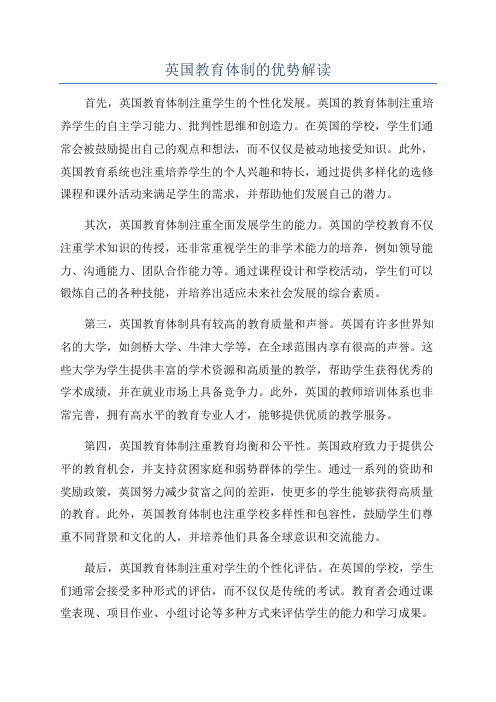
英国教育体制的优势解读首先,英国教育体制注重学生的个性化发展。
英国的教育体制注重培养学生的自主学习能力、批判性思维和创造力。
在英国的学校,学生们通常会被鼓励提出自己的观点和想法,而不仅仅是被动地接受知识。
此外,英国教育系统也注重培养学生的个人兴趣和特长,通过提供多样化的选修课程和课外活动来满足学生的需求,并帮助他们发展自己的潜力。
其次,英国教育体制注重全面发展学生的能力。
英国的学校教育不仅注重学术知识的传授,还非常重视学生的非学术能力的培养,例如领导能力、沟通能力、团队合作能力等。
通过课程设计和学校活动,学生们可以锻炼自己的各种技能,并培养出适应未来社会发展的综合素质。
第三,英国教育体制具有较高的教育质量和声誉。
英国有许多世界知名的大学,如剑桥大学、牛津大学等,在全球范围内享有很高的声誉。
这些大学为学生提供丰富的学术资源和高质量的教学,帮助学生获得优秀的学术成绩,并在就业市场上具备竞争力。
此外,英国的教师培训体系也非常完善,拥有高水平的教育专业人才,能够提供优质的教学服务。
第四,英国教育体制注重教育均衡和公平性。
英国政府致力于提供公平的教育机会,并支持贫困家庭和弱势群体的学生。
通过一系列的资助和奖励政策,英国努力减少贫富之间的差距,使更多的学生能够获得高质量的教育。
此外,英国教育体制也注重学校多样性和包容性,鼓励学生们尊重不同背景和文化的人,并培养他们具备全球意识和交流能力。
最后,英国教育体制注重对学生的个性化评估。
在英国的学校,学生们通常会接受多种形式的评估,而不仅仅是传统的考试。
教育者会通过课堂表现、项目作业、小组讨论等多种方式来评估学生的能力和学习成果。
这种评估方法能够更全面地了解学生的学习情况和需求,并为他们提供相应的支持和指导。
综上所述,英国教育体制具有多个优势,如注重个性化发展、全面发展学生能力、高质量和声誉、教育均衡和公平性以及个性化评估等。
这些优势使得英国的教育体系能够更好地满足学生的需求,培养出优秀的人才,并享有国际声誉。
英国教学实践(3篇)
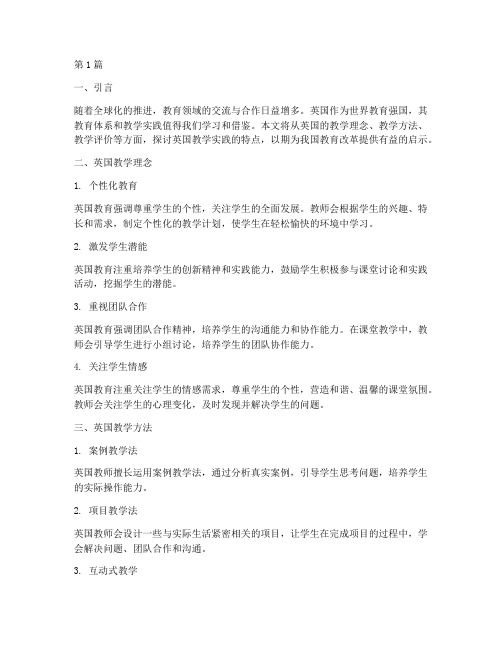
第1篇一、引言随着全球化的推进,教育领域的交流与合作日益增多。
英国作为世界教育强国,其教育体系和教学实践值得我们学习和借鉴。
本文将从英国的教学理念、教学方法、教学评价等方面,探讨英国教学实践的特点,以期为我国教育改革提供有益的启示。
二、英国教学理念1. 个性化教育英国教育强调尊重学生的个性,关注学生的全面发展。
教师会根据学生的兴趣、特长和需求,制定个性化的教学计划,使学生在轻松愉快的环境中学习。
2. 激发学生潜能英国教育注重培养学生的创新精神和实践能力,鼓励学生积极参与课堂讨论和实践活动,挖掘学生的潜能。
3. 重视团队合作英国教育强调团队合作精神,培养学生的沟通能力和协作能力。
在课堂教学中,教师会引导学生进行小组讨论,培养学生的团队协作能力。
4. 关注学生情感英国教育注重关注学生的情感需求,尊重学生的个性,营造和谐、温馨的课堂氛围。
教师会关注学生的心理变化,及时发现并解决学生的问题。
三、英国教学方法1. 案例教学法英国教师擅长运用案例教学法,通过分析真实案例,引导学生思考问题,培养学生的实际操作能力。
2. 项目教学法英国教师会设计一些与实际生活紧密相关的项目,让学生在完成项目的过程中,学会解决问题、团队合作和沟通。
3. 互动式教学英国课堂注重师生互动,教师会采用多种教学手段,如提问、讨论、角色扮演等,激发学生的学习兴趣。
4. 体验式教学英国教师会组织学生参加各种实践活动,让学生在实践中学习知识、提高能力。
四、英国教学评价1. 过程性评价英国教学评价注重过程性,关注学生在学习过程中的表现,如课堂参与、作业完成情况等。
2. 综合性评价英国教学评价注重综合性,评价内容包括学生的知识、技能、情感、态度等方面。
3. 个性化评价英国教学评价注重个性化,根据学生的特点制定评价标准,关注学生的进步和发展。
4. 多元化评价英国教学评价采用多元化评价方式,如课堂观察、学生自评、互评、家长评价等,全面了解学生的学习情况。
英国教育体制论文
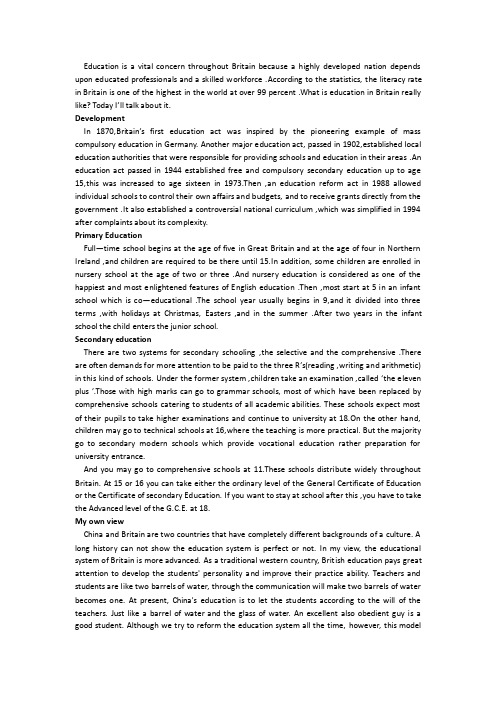
Education is a vital concern throughout Britain because a highly developed nation depends upon educated professionals and a skilled workforce .According to the statistics, the literacy rate in Britain is one of the highest in the world at over 99 percent .What is education in Britain really like? Today I’ll talk about it.DevelopmentIn 1870,Britain’s first education act was inspired by the pioneering example of mass compulsory education in Germany. Another major education act, passed in 1902,established local education authorities that were responsible for providing schools and education in their areas .An education act passed in 1944 established free and compulsory secondary education up to age 15,this was increased to age sixteen in 1973.Then ,an education reform act in 1988 allowed individual schools to control their own affairs and budgets, and to receive grants directly from the government .It also established a controversial national curriculum ,which was simplified in 1994 after complaints about its complexity.Primary EducationFull—time school begins at the age of five in Great Britain and at the age of four in Northern Ireland ,and children are required to be there until 15.In addition, some children are enrolled in nursery school at the age of two or three .And nursery education is considered as one of the happiest and most enlightened features of English education .Then ,most start at 5 in an infant school which is co—educational .The school year usually begins in 9,and it divided into three terms ,with holidays at Christmas, Easters ,and in the summer .After two years in the infant school the child enters the junior school.Secondary educationThere are two systems for secondary schooling ,the selective and the comprehensive .There are often demands for more attention to be paid to the three R’s(reading ,writing and arithmetic) in this kind of schools. Under the former system ,children take an examination ,called ‘the eleven plus ’.Those with high marks can go to grammar schools, most of which have been replaced by comprehensive schools catering to students of all academic abilities. These schools expect most of their pupils to take higher examinations and continue to university at 18.On the other hand, children may go to technical schools at 16,where the teaching is more practical. But the majority go to secondary modern schools which provide vocational education rather preparation for university entrance.And you may go to comprehensive schools at 11.These schools distribute widely throughout Britain. At 15 or 16 you can take either the ordinary level of the General Certificate of Education or the Certificate of secondary Education. If you want to stay at school after this ,you have to take the Advanced level of the G.C.E. at 18.My own viewChina and Britain are two countries that have completely different backgrounds of a culture. A long history can not show the education system is perfect or not. In my view, the educational system of Britain is more advanced. As a traditional western country, British education pays great attention to develop the students' personality and improve their practice ability. Teachers and students are like two barrels of water, through the communication will make two barrels of water becomes one. At present, China's education is to let the students according to the will of the teachers. Just like a barrel of water and the glass of water. An excellent also obedient guy is a good student. Although we try to reform the education system all the time, however, this modelof the exam-oriented education is unchanged; the concept will not be updated.SummaryThe education system in Britain ,when they change one idea to another ,they don’t get rid of the old idea ,they keep the old idea as well as the new one .So over the time ,their education has become more and more complicate and advanced .In the future, I hope I can go to Britain to enjoy their education.。
英国教育系统的优缺点英语作文

英国教育系统的优缺点英语作文The British education system, like any other system, has its own set of advantages and disadvantages. As a student who has experienced the British education system firsthand, I can provide insights into both the strengths and weaknesses of this system.One of the key advantages of the British education system is its emphasis on critical thinking and independent learning. Students are encouraged to think for themselves, analyze information, and form their own opinions. This approach helps students develop valuable skills that are essential for success in the modern world.Furthermore, the British education system places a strong emphasis on creativity and innovation. Students are encouraged to think outside the box, explore new ideas, and express themselves in a variety of ways. This focus on creativity helps students develop their unique talents and abilities, preparing them for a wide range of future opportunities.Another advantage of the British education system isits flexibility. Students have the opportunity to choose from a wide range of subjects and tailor their education to suit their interests and career goals. This flexibility allows students to pursue their passions and develop expertise in areas that they are truly passionate about.Moreover, the British education system is known for its high academic standards. British qualifications are recognized and respected worldwide, opening up a wealth of opportunities for students who graduate from the system. The rigorous curriculum and assessment methods ensure that students are well-prepared for further education or the workforce.Despite these strengths, the British education system also has its drawbacks. One of the main criticisms of the system is its focus on standardized testing. The emphasis on exams and grades can create a high-pressure environment for students, leading to stress and anxiety. This focus on testing can also limit creativity and critical thinking, as students may prioritize memorization over understanding.Additionally, the British education system has been criticized for its lack of inclusivity and diversity. Some argue that the system does not adequately cater to theneeds of all students, particularly those from disadvantaged backgrounds or with special educational needs. This lack of inclusivity can lead to inequalities in educational outcomes and opportunities.Furthermore, the British education system has faced challenges in terms of funding and resources. Budget cuts and austerity measures have impacted schools and colleges, leading to overcrowded classrooms, limited access to resources, and reduced extracurricular opportunities. These challenges can hinder the quality of education and limitthe potential of students to succeed.In conclusion, the British education system has both strengths and weaknesses. While it promotes critical thinking, creativity, and academic excellence, it alsofaces challenges related to standardized testing, inclusivity, and funding. By addressing these drawbacks and building on its strengths, the British education system can continue to provide students with a high-quality educationthat prepares them for success in the 21st century.。
对英国教育体系的看法英语作文

对英国教育体系的看法英语作文篇1:It is better to be uneducated than not to be educated, for ignorance is the root of misfortune (Plato, ancient Greek philosopher). He is willing to learn and teach (Chaucer, British poet). A teacher has eternal influence, and he never knows where his influence stops (herbardam, American historian).All forms of dance can't be excluded from all courses. Noble education: dancing with feet, dancing with ideas, dancing with works, I need to add that one must also be able to dance with a pen (Friedrich weinitzche, German philosopher). Education begins at the knee of parents, and every word children hearsay says tends to form a character (Hosea Ballou) Education doesn't mean teaching people what they don't know, it means educating them to do what they shouldn't (John Ruskin, British art critic).Education is the gradual discovery of our ignorance (Durant) education is an admirable thing, but we should always remember that there is nothing worth knowing that cannot be taught (Oscar Wilde, British dramatist) the goal of education is the formation of character (Herbert Spencer) education produced a large number of people who can read (George Macaulay trevorian, British historian) education is not a bucket full of water, but a fire. (William Butler Yeats, Irish poet) educationis the main defense of the nation (Edmund Brooke, British statesman) education is the spread of civilization (American historian and essayist will ·Education makes a nation easy to lead, but not easy to enslave (bloom, British statesman)) everyone has two kinds of education, one from others, the other more important, (Edward Gibbon, British historian).篇2:In most cases, students age from primary school to secondary school. In some areas, the primary and secondary levels are further subdivided. In a few areas, there are three-level education system.Nursery education from the age of to the state funded can befull-time or full-time. If registered in the state, it starts from the semester after the child's fifth birthday, Children can enter school in September of the school year to start school in September of the school year, or unless students choose to stay in the education system, school attendance ends on the last Friday in June, the school year reaches the age under the national curriculum system, and all students receive standard assessment tests at the end of the critical stage of the core subjects, rather than basic subjects. In the case of teacher assessment, they usually take the GCSE examination in the last two years of the critical phase, but they can also take other levels of qualification. For example, GNVQ's previous test at the end of the critical phase is abandoned after the test.At this time, the scoring process in the critical stage is seriously problematic. The assessment is conducted by the teachers, and the sixth year's College score is called "sixth grade" The use of the words "grade / Junior Grade 6" and "grade / Senior Grade 6" reflects their unique and voluntary nature and status. This is especially true in history.This is due to the system of public schools. All forms are divided into lower grade, higher grade, sometimes junior grade and year version It should be called the "lower quarter", and so on. In some private schools, such as Wellington girls' school, this method of calculating years (lower quarter, upper quarter, lower fifth, etc.) is still in use.。
有关英国教育制度的论文

有关英国教育制度的论文从20世纪中后期开始,英国政府开始着手教育制度的改革,职业教育的地位和层次得到提升,初步形成以职业能力培养、资格证书制度、考核评估制度等为基本内容的职业教育体系。
下面是店铺给大家推荐的有关英国教育的论文,希望能对大家有所帮助!英国教育的论文篇一:《英国职业教育改革的新进展》摘要:新世纪以来,英国职业教育改革不断取得新进展。
政府积极立法,为改革创建良好的环境;完善职业教育质量保障机制、调整职业资格标准和评估标准;推行新的资格与学分框架及通用检查框架、倡导多元化的职业教育等措施努力建构世界一流的技能体系。
关键词:英国;职业教育;资格框架;评估制度从20世纪中后期开始,英国政府开始着手教育制度的改革,职业教育的地位和层次得到提升,初步形成以职业能力培养、资格证书制度、考核评估制度等为基本内容的职业教育体系。
进入21世纪以来,职业教育对开拓技术创新能力,提升国际竞争力的作用突显。
作为英国国家技能战略的重要内容,英国职业教育改革不断取得新的进展,职业教育体系日益完善。
一、英国职业教育改革的背景与目标新经济增长理论指出,产品的研究与开发、教育与培训是经济增长的关键因素。
这为政府决策者提供了信号,明确了他们所要干预的重点内容,包括学校阶段进行的职业生涯培训[1]。
进入新世纪以来,社会和经济发展对于技能的需求进一步变化,社会成员只有不断更新知识、技能和观念,才能适应工作和生活的需要,技能教育与培训呈现出全民化和终身性的趋势。
英国同其他一些发达国家一样,对本国的技能开发和培训体系在结构、内容、方法和资金方式等方面进行了重要改革,联合政府提出了新的技能开发战略,将劳动力技能水平的提高作为实现社会经济可持续增长的保证,将其视为“增强社会经济包容性和流动性的基础;构建大社会的基石”。
[2]同时,职业教育的理念也在不断更新。
一方面,伴随新职业主义的发展,作为英国现代职业教育改革的基本指导思想,核心能力的内涵不断演变;另一方面,就职业教育与培训的作用而言,已经不仅是为工作所做的必要准备,更进一步的功能是通过职业生活实现社会的可持续发展。
英国学校教育制度分析论文
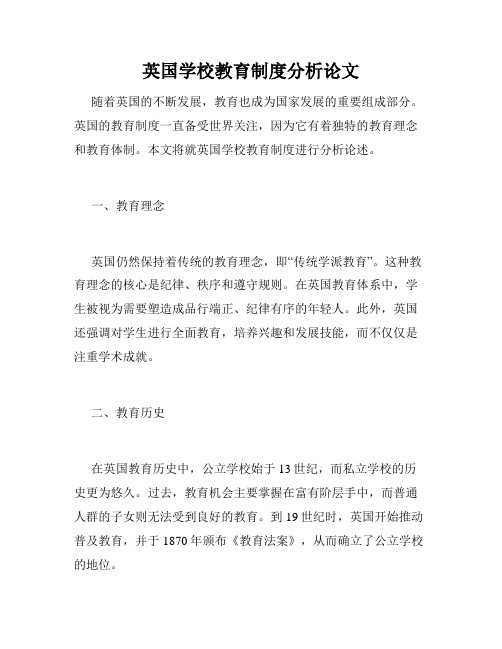
英国学校教育制度分析论文随着英国的不断发展,教育也成为国家发展的重要组成部分。
英国的教育制度一直备受世界关注,因为它有着独特的教育理念和教育体制。
本文将就英国学校教育制度进行分析论述。
一、教育理念英国仍然保持着传统的教育理念,即“传统学派教育”。
这种教育理念的核心是纪律、秩序和遵守规则。
在英国教育体系中,学生被视为需要塑造成品行端正、纪律有序的年轻人。
此外,英国还强调对学生进行全面教育,培养兴趣和发展技能,而不仅仅是注重学术成就。
二、教育历史在英国教育历史中,公立学校始于13世纪,而私立学校的历史更为悠久。
过去,教育机会主要掌握在富有阶层手中,而普通人群的子女则无法受到良好的教育。
到19世纪时,英国开始推动普及教育,并于1870年颁布《教育法案》,从而确立了公立学校的地位。
20世纪,英国教育改革开展得更加深入。
1944年,新政府颁布的《1944年教育法案》使得所有的儿童都有机会接受免费教育。
1988年的《教育改革法案》增加了对学校管理的自主权和授予学校更多的资源,这种教育制度被认为有效地推动了英国教育的改革。
三、教育体制英国教育体制分为三个层次:基础教育、中等教育和高等教育。
基础教育:包括幼儿园和小学。
幼儿园适合小孩子,通常从2岁至5岁,是一种较为普及的教育形式,向学生提供基本的知识和技能。
小学适合年龄在5岁至11岁之间的学生,覆盖了基本学科,培养学生的阅读、写作和计算等能力。
中等教育:包括中学和学徒制教育。
中学适宜年龄在11岁至16岁之间的学生,在此期间学生基本完成了所有必修科目的学习,以备上大学和进入工作岗位。
学徒制教育在英国非常普及,它通过在公司对学生职业技能的培养,为学生提供了一门可以获得实际经验的课程。
高等教育:包括大学和高等教育机构。
在英国,大学是由学生自主选择,并按专业而分配的,拥有完善的课程体系、设施和设备。
高等教育机构提供一些特别的学习机会,例如艺术设计、音乐、瑜伽等等。
四、班级管理英国班级管理主要包括五个方面:1、班级管理;2、课堂管理;3、家长合作;4、学生评估;5、校园管理。
当代英国基础教育政策及其影响浅析的论文
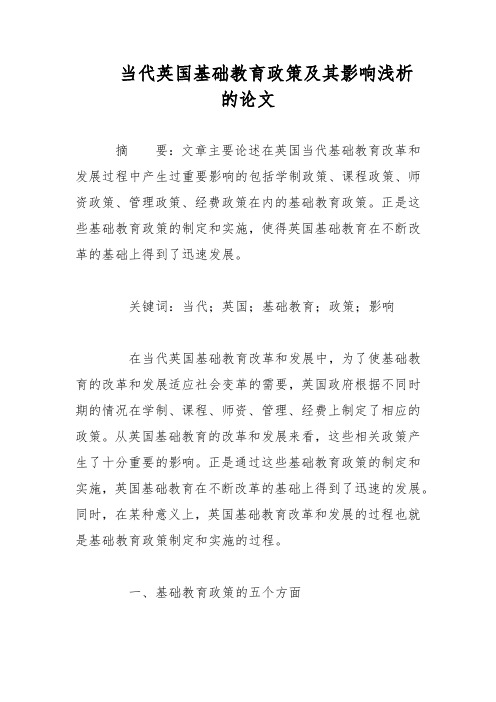
当代英国基础教育政策及其影响浅析的论文摘要:文章主要论述在英国当代基础教育改革和发展过程中产生过重要影响的包括学制政策、课程政策、师资政策、管理政策、经费政策在内的基础教育政策。
正是这些基础教育政策的制定和实施,使得英国基础教育在不断改革的基础上得到了迅速发展。
关键词:当代;英国;基础教育;政策;影响在当代英国基础教育改革和发展中,为了使基础教育的改革和发展适应社会变革的需要,英国政府根据不同时期的情况在学制、课程、师资、管理、经费上制定了相应的政策。
从英国基础教育的改革和发展来看,这些相关政策产生了十分重要的影响。
正是通过这些基础教育政策的制定和实施,英国基础教育在不断改革的基础上得到了迅速的发展。
同时,在某种意义上,英国基础教育改革和发展的过程也就是基础教育政策制定和实施的过程。
一、基础教育政策的五个方面二战后,特别是20世纪80年代以来,英国政府根据不同情况制定了相应的基础教育政策,而且不断地对基础教育政策进行修正。
正是在基础教育政策的制定、实施和修正过程中,英国基础教育的改革得以不断地向前推进。
(一)学制政策1.实施普及义务教育对英国基础教育来说,1918年颁布的《费舍法案》具有里程碑的意义,因为从此以后英国实行了免费的初等教育。
在20世纪前半期,英国在普及初等教育的基础上又开始了普及中等教育的努力,并在《1944年教育法》颁布后最终实行免费的中等教育。
在二战后实施普及义务教育的过程中,英国坚持实行基础教育免费的政策。
英国政府1992年发表的教育白皮书指出:“地方教育当局将继续负有最后责任,保证所有儿童入学或另外接受适当的教育。
”与此同时,“家长也有义务确保其子女在5-16岁时定时入学或另外接受到适合的教育。
”因此从1992年秋季开始,所有公立学校都必须在学校概况介绍和年度报告中公布没有正当理由的学生缺席的情况;从1998年起,这种学生缺席的情况将在地方发布的所有学校工作的排行表中公布。
英国教育的相关论文

英国教育的相关论文《感受英国教育》【摘要】英国作为一个教育理念和教育体系都较成熟的国家,无论在课堂教育还是职业教育方面都有值得我们学习的地方。
英国“以学生为中心”的教学理念,因材施教、灵活多样的课堂组织形式,注重学以致用,与生活息息相关的教学内容,对教学评估的重视,对多媒体的适度应用,这些对我们提高教学质量都有启发。
英国较为完善的职业教育体系对我国目前职业教育的建设和发展也有着可借鉴之处。
【关键词】英国教育课堂教学教育理念职业教育【中图分类号】G649 【文献标识码】A 【文章编号】1674-4810202121-0039-032021年暑期,我在英国South Lanarkshire College参加了语言培训,亲身体会了英国的教育理念,亲历英国的语言教学。
其间,我用心观察和学习,开阔了眼界,增长了见识,在各方面都有不少心得与体会。
一教育理念英国教育以其先进的教育理念闻名于世界,它突出表现为以下特点:1.以学生为中心教学类型可分为“以学生为中心”和“以教师为中心”两种。
“以教师为中心”教学最明显的特征就是忽视了学生学习主体的作用,通常采用集体的、满堂灌的讲授式教学。
相应地“以学生为中心”的教学的特征是重视和体现学生的主体作用,同时又不忽视教师的主导作用,通常采用协作式、个别化、小组讨论等教学形式或采用多种教学形式组合起来进行教学。
“谁是学生学习外部活动的控制者和管理者”是判断是否以学生为中心的教学的重要特征。
如果在教学中学生自己负责控制和管理学习活动,那么这种教学便是以学生为中心的,相反则是以教师为中心的教学。
在英国学习时,外教多采用以学生为中心的教学方式。
在教学内容和教学方式的选择上会根据学生的需要来安排。
教学方式更灵活的外教会根据学生的特点和需要带学生去户外上课,通过实地接触和了解当地的风土人情来了解当地的文化,这是相当受学生欢迎的,而且对学生而言确实是受益匪浅。
在学习“以学生为中心”的教学模式同时也要注意到,“以学生为中心”的教学模式受到很多限制,并不是任何时候拿来即可用,在使用过程中要受到学生素质的限制。
英国教育的发展范文
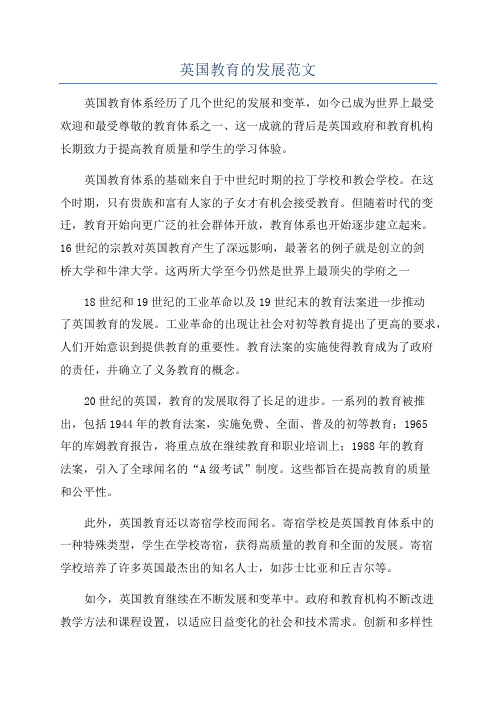
英国教育的发展范文英国教育体系经历了几个世纪的发展和变革,如今已成为世界上最受欢迎和最受尊敬的教育体系之一、这一成就的背后是英国政府和教育机构长期致力于提高教育质量和学生的学习体验。
英国教育体系的基础来自于中世纪时期的拉丁学校和教会学校。
在这个时期,只有贵族和富有人家的子女才有机会接受教育。
但随着时代的变迁,教育开始向更广泛的社会群体开放,教育体系也开始逐步建立起来。
16世纪的宗教对英国教育产生了深远影响,最著名的例子就是创立的剑桥大学和牛津大学。
这两所大学至今仍然是世界上最顶尖的学府之一18世纪和19世纪的工业革命以及19世纪末的教育法案进一步推动了英国教育的发展。
工业革命的出现让社会对初等教育提出了更高的要求,人们开始意识到提供教育的重要性。
教育法案的实施使得教育成为了政府的责任,并确立了义务教育的概念。
20世纪的英国,教育的发展取得了长足的进步。
一系列的教育被推出,包括1944年的教育法案,实施免费、全面、普及的初等教育;1965年的库姆教育报告,将重点放在继续教育和职业培训上;1988年的教育法案,引入了全球闻名的“A级考试”制度。
这些都旨在提高教育的质量和公平性。
此外,英国教育还以寄宿学校而闻名。
寄宿学校是英国教育体系中的一种特殊类型,学生在学校寄宿,获得高质量的教育和全面的发展。
寄宿学校培养了许多英国最杰出的知名人士,如莎士比亚和丘吉尔等。
如今,英国教育继续在不断发展和变革中。
政府和教育机构不断改进教学方法和课程设置,以适应日益变化的社会和技术需求。
创新和多样性已成为英国教育的重要特点之一、例如,近年来英国不断推进STEM教育,鼓励学生在科学、技术、工程和数学领域展开学习和研究。
此外,英国教育对国际学生也是非常友好和吸引力的。
留学生占据了英国大学的重要组成部分,他们丰富了教育环境和促进了国际间的交流与理解。
虽然英国教育体系已经取得了巨大的成就,但仍然面临一些挑战和问题。
其中之一是教育资源和机会的不均衡分配。
英国教育制度范文

英国教育制度范文首先,幼儿教育是英国教育体系的起点。
幼儿教育主要面向3岁到5岁的儿童,目的是为他们提供一个早期的学习和社交环境。
根据英国政府的规定,幼儿教育是免费的,并且可以选择在公立或私立的幼儿园就读。
幼儿园的课程主要注重儿童的社交能力、语言发展、数学和基础科学知识。
接下来是初等教育,也就是小学教育。
小学教育从5岁开始,通常一直持续到11岁。
随着英国国家课程的,小学教育强调以核心学科为基础的综合教育。
核心学科包括英语、数学和科学。
此外,小学教育还包括人文科学,如历史、地理和艺术。
小学教育的目标是培养学生的基本技能和知识,并为他们为中等教育做好准备。
高等教育是英国教育体系的最高层次,也是最为重要的一部分。
英国拥有世界上一些最古老和知名的大学,如牛津大学和剑桥大学。
高等教育包括本科教育和研究生教育。
本科教育通常需要三年时间,学生可以在这段时间内专注于学习自己所选择的学科。
与其他国家的大学教育制度相比,英国的大学教育更加注重学术研究和学生自主学习。
此外,英国教育制度还有一些特点值得一提。
首先,英国的教育制度非常注重学术的严肃性和专业性。
其次,英国鼓励学生积极参与社会活动和实践经验。
学生可以通过参加学校社团、户外教育和义工活动来发展其领导才能和团队合作精神。
最后,英国的教育制度注重个体发展和培养创造力。
学生被鼓励独立思考、批判性思维和创新。
总之,英国教育制度以其严谨性、公正性和质量而受到全球的赞誉。
从幼儿教育到高等教育,英国的教育制度致力于培养学生的学术能力和综合素质。
无论是在国内还是国际,英国教育制度都被视为成功的典范。
- 1、下载文档前请自行甄别文档内容的完整性,平台不提供额外的编辑、内容补充、找答案等附加服务。
- 2、"仅部分预览"的文档,不可在线预览部分如存在完整性等问题,可反馈申请退款(可完整预览的文档不适用该条件!)。
- 3、如文档侵犯您的权益,请联系客服反馈,我们会尽快为您处理(人工客服工作时间:9:00-18:30)。
Education is a vital concern throughout Britain because a highly developed nation depends upon educated professionals and a skilled workforce .According to the statistics, the literacy rate in Britain is one of the highest in the world at over 99 percent .What is education in Britain really like? Today I’ll talk about it.
Development
In 1870,Britain’s first education act was inspired by the pioneering example of mass compulsory education in Germany. Another major education act, passed in 1902,established local education authorities that were responsible for providing schools and education in their areas .An education act passed in 1944 established free and compulsory secondary education up to age 15,this was increased to age sixteen in 1973.Then ,an education reform act in 1988 allowed individual schools to control their own affairs and budgets, and to receive grants directly from the government .It also established a controversial national curriculum ,which was simplified in 1994 after complaints about its complexity.
Primary Education
Full—time school begins at the age of five in Great Britain and at the age of four in Northern Ireland ,and children are required to be there until 15.In addition, some children are enrolled in nursery school at the age of two or three .And nursery education is considered as one of the happiest and most enlightened features of English education .Then ,most start at 5 in an infant school which is co—educational .The school year usually begins in 9,and it divided into three terms ,with holidays at Christmas, Easters ,and in the summer .After two years in the infant school the child enters the junior school.
Secondary education
There are two systems for secondary schooling ,the selective and the comprehensive .There are often demands for more attention to be paid to the three R’s(reading ,writing and arithmetic) in this kind of schools. Under the former system ,children take an examination ,called ‘the eleven plus ’.Those with high marks can go to grammar schools, most of which have been replaced by comprehensive schools catering to students of all academic abilities. These schools expect most of their pupils to take higher examinations and continue to university at 18.On the other hand, children may go to technical schools at 16,where the teaching is more practical. But the majority go to secondary modern schools which provide vocational education rather preparation for university entrance.
And you may go to comprehensive schools at 11.These schools distribute widely throughout Britain. At 15 or 16 you can take either the ordinary level of the General Certificate of Education or the Certificate of secondary Education. If you want to stay at school after this ,you have to take the Advanced level of the G.C.E. at 18.
My own view
China and Britain are two countries that have completely different backgrounds of a culture. A long history can not show the education system is perfect or not. In my view, the educational system of Britain is more advanced. As a traditional western country, British education pays great attention to develop the students' personality and improve their practice ability. Teachers and students are like two barrels of water, through the communication will make two barrels of water becomes one. At present, China's education is to let the students according to the will of the teachers. Just like a barrel of water and the glass of water. An excellent also obedient guy is a good student. Although we try to reform the education system all the time, however, this model
of the exam-oriented education is unchanged; the concept will not be updated.
Summary
The education system in Britain ,when they change one idea to another ,they don’t get rid of the old idea ,they keep the old idea as well as the new one .So over the time ,their education has become more and more complicate and advanced .In the future, I hope I can go to Britain to enjoy their education.。
